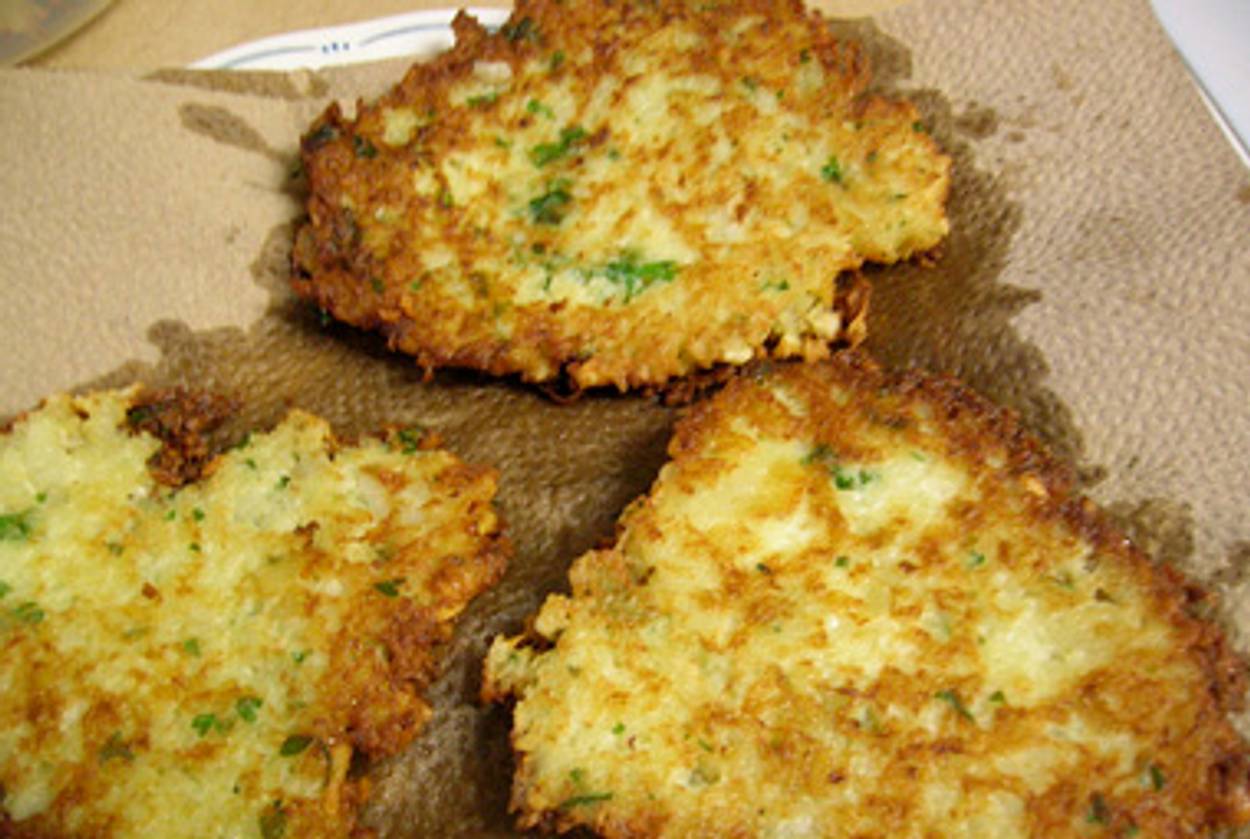Consider the Latke
An evening at the Brooklyn Latke Festival




“The spiritual question is: ‘What is a latke?’” Ron Ben-Israel, owner of Ron Ben-Israel Cakes and host of the Food Network’s Sweet Genius, informed me at Monday evening’s Brooklyn Latke Festival.
After seventeen latkes, including two of The Plaza’s offering of latke topped with foie gras topped with fig balsamic reduction, I shrugged as much as my onsetting catatonic spell would allow. He answered his own inquiry in a shout: “The latke is poor people’s food!”
Ben-Israel had made his latkes with potato and parsnips—root vegetables, he explained—and topped them with a jelly of baked apples, cranberries, oranges, and other fruits that brought to mind the delicate sufganiyah, the palliative Hanukkah Bonnie to the latke’s gastrointestinal-wrenching Clyde. The jelly had been caramelized, brûléed actually, with a torch that Ben-Israel smirkingly dubbed “the Flame of the Maccabee.”
If Ron, Son of Israel, had meant to distinguish his latkes as the evening’s peasant bread, he was surprisingly in the right. Of the seventeen participants, nearly all of them had eschewed the Dickensian latke in favor of the baroque whims of the foodie palate. (And at $30 per ticket, the sold-out event wasn’t for the financially meek.) Kutsher’s Tribeca had a kumquat, lingonberry, ricotta, and chanterelle-maitake-black trumpet mushroom fried nimbus that drowned in decadence. Mae Mae Cafe’s reuben latke had a cabbage flan atop corned beef and swiss—which was not as conspicuously trayf as the chorizo empanadas that made their way out to quell a restive crowd that didn’t get to sample all the latkes before the vendors ran out. There were latkes that featured kaymak, rose, quince, kale, sweet potato, papaya, and oxtail marmalade. Dori Fern, winner of the online latke recipe contest, featured a latke with a five-spice duck confit. When asked if she was a professional, Fern laughed and said “not yet” before announcing that she was now the proud owner of the url BestLatkes.com.
Boerum Hill’s Mile End went to what they do best, a latke with applesauce and tender duck pastrami, all cured in-house and topped with duck skin cracklings.
“We fried them in duck fat,” said owner Rae Cohen. “Might as well go all the way.”
“What the hell is the music?” her husband Noah Bernamoff asked as an odd medley of Israeli hip-hop and klezmer blared throughout the hall.
Perhaps most telling of the excess was Great Performances—caterer, co-sponsor of the event, and second-place winner—whose presentation had drawn a line in the sand between the classes. Their two offerings were called, respectively, the 99 percent—a latke with a cocktail weenie served with a shot of Brooklyn Brewery beer—and the 1 percent—a latke topped with a quail egg, caviar, and an accompanying shot of Grey Goose.
Amidst all the lavish, there was some pushback. Veselka, the East Village mainstay and occasional heating lodge for bleary-eyed NYU philosophy graduate students (whose Ukrainian cuisine frequently serves as a double for what these Jewish kids’ mothers used to feed them), gave the crowd the paragon of starchy simplicity. “We made a conscious decision to keep it traditional,” said owner Tom Birchard. “We have a secret ingredient in the apple sauce and that’s about as avant-garde as we got.”
The People’s Choice Award, voted on by the attendees, highlighted the appeal of both old and new. It went to Tablet Magazine contributor Bill Telepan, whose latke was a celery root potato latke with green apple sour cream.
The judges, who wore necklaces with gilded frying pans, awarded Almond first prize for a potato concoction that had a blue fish and goat yogurt topping. Judge and Brooklyn Borough President Marty Markowitz pronounced, “Everything you’ve eaten tonight is calorie-free.” When asked for his favorite, Markowitz demurred.
“I can’t eat some of them, because I don’t eat duck for instance—my diet restrictions. So I really didn’t judge, it wouldn’t have been fair to the contestants. I can’t try everything. But there’s no losers in this.”
Related: Brisket Business [Tablet Magazine]
Adam Chandler was previously a staff writer at Tablet. His work has appeared in the New York Times, the Wall Street Journal, the Atlantic, Slate, Esquire, New York, and elsewhere. He tweets @allmychandler.